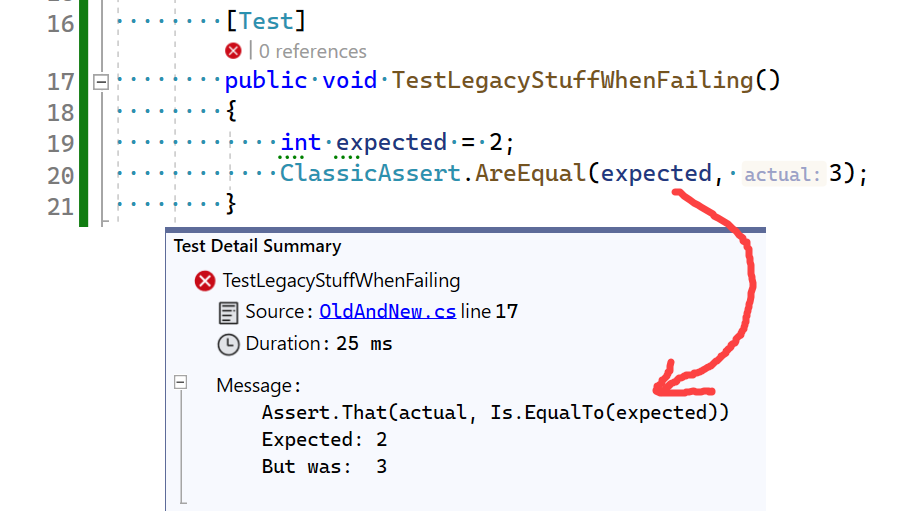Assertions
Assertions are central to unit testing in any of the xUnit frameworks, and NUnit is no exception. NUnit provides a rich set of assertions as static methods of the Assert class.
If an assertion fails, the method call does not return and an error is reported. If a test contains multiple assertions, any that follow the one that failed will not be executed. For this reason, it's usually best to try for one assertion per test.
Each method may be called without a message, with a simple text message or with a message with interpolated arguments (aka interpolated string).
Two Models
In NUnit 3.0 and higher, assertions are written primarily using the Assert.That method, which takes constraint
objects as an argument. We call this the Constraint Model of assertions.
In earlier versions of NUnit, a separate method of the Assert class was used for each different assertion. This Classic Model is still supported but since no new features have been added to it for some time, the constraint-based model must be used in order to have full access to NUnit's capabilities.
For example, the following code must use the constraint model. There is no real classic equivalent.
int[] array = { 1, 2, 3 };
Assert.That(array, Has.Exactly(1).EqualTo(3));
Assert.That(array, Has.Exactly(2).GreaterThan(1));
Assert.That(array, Has.Exactly(3).LessThan(100));
Where equivalents do exist, the two approaches will always give the same result, because the methods of the classic approach have all been implemented internally using constraints. For example...
ClassicAssert.AreEqual(4, 2 + 2);
Assert.That(2 + 2, Is.EqualTo(4));
Some notes on the Classic/Legacy asserts
From version 4.5
The Classic assertions are back in the NUnit.Framework namespace.
You don't need to add what is described below for these.
PS: There are a few that are still there, we'll get them over in the next releases.
[!NOTE]
The Classic assertions are still available in the NUnit.Framework.Legacy too,
so you don't need to refactor back. You now have both worlds at the same time.
Versions 4.0 to 4.4
The classic/legacy asserts, like ClassicAssert.AreEqual, have now been moved into its own project (namespace), and
may later be released as a separate package. They are now in the namespace NUnit.Framework.Legacy, and the Assert
have been renamed to ClassicAssert.
If you're upgrading from NUnit 3.X to NUnit 4, you need to add a using for NUnit.Framework.Legacy to your test
classes, and rename all classic asserts from Assert to ClassicAssert.
You can freely mix the constraint model assertions and the classic asserts in the same test class.
All assertions in the ClassicAssert class are rerouting to use the constraint model.
As shown in the example in Towards NUnit 4, error message have been enhanced so that you see the Assert expression. This also works for the ClassicAsserts, but what you will see there is the equivalent constraint expression.
